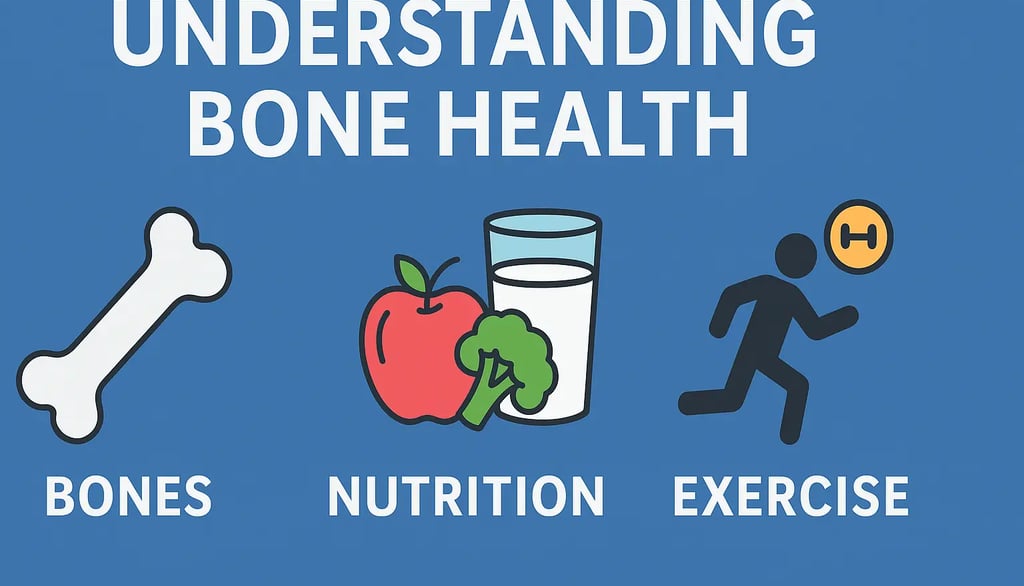Understanding Bone Health: Nutrition, Exercise & Lifestyle for Strong Bones
Learn how to improve bone health with the right nutrition, exercise, and lifestyle choices. Discover the role of calcium, vitamin D, and weight-bearing workouts in preventing osteoporosis and boosting bone density.


Understanding Bone Health: Nutrition, Exercise, and Lifestyle for Stronger Bones
Bone health is a vital part of overall well-being, as bones not only provide the body’s framework but also protect vital organs. Bones are living tissues that constantly undergo remodeling—a process of breaking down old bone (resorption) and building new bone (formation). This balance is essential for maintaining bone density and strength.
A healthy bone structure is made up of collagen, which provides flexibility, and mineral deposits like hydroxyapatite, which give bones rigidity. Factors such as age, sex, and genetics play a major role in bone density. That’s why adopting lifelong habits that promote strong bones and osteoporosis prevention is critical.
What Is Bone Density and Why Does It Matter?
Bone density refers to the amount of minerals, mainly calcium, packed into bone tissue. High bone density indicates stronger bones and lowers the risk of fractures. Low bone density can lead to osteoporosis, a condition where bones become brittle and fragile.
Osteoporosis risks: Increased fractures, mobility issues, and reduced quality of life.
Prevention: A nutrient-rich diet, regular exercise, and avoiding harmful habits like smoking or excessive alcohol.
Maintaining bone density is especially important as we age, since bone loss naturally accelerates over time.
Nutritional Essentials for Strong Bones
A bone-healthy diet ensures that the body gets the right nutrients to build and maintain bone strength.
1. Calcium – The Foundation of Strong Bones
Adults need about 1,000–1,200 mg per day.
Sources: Milk, yogurt, cheese, kale, broccoli, fortified plant-based milk.
2. Vitamin D – Helps Absorb Calcium
Without vitamin D, calcium can’t be properly absorbed.
Sources: Sunlight, fatty fish (salmon, mackerel), egg yolks, fortified foods.
3. Magnesium – Supports Bone Structure
Aids calcium metabolism and vitamin D activation.
Sources: Nuts, seeds, whole grains, legumes.
4. Vitamin K – Directs Calcium to Bones
Prevents calcium from building up in arteries.
Sources: Leafy greens like spinach, kale, and broccoli.
👉 A balanced diet with these nutrients helps prevent bone loss and fractures while supporting long-term skeletal health.
The Role of Exercise in Building Bone Strength
Exercise is one of the most effective ways to improve bone density and prevent osteoporosis.
Best Exercises for Bone Health
Weight-bearing exercises: Walking, jogging, dancing, stair climbing.
Resistance training: Weight lifting, resistance bands, bodyweight workouts.
Balance and flexibility exercises: Yoga and tai chi to prevent falls and fractures.
Key Principles
Consistency matters: Regular activity helps maintain density.
Progressive overload: Gradually increasing weights or intensity boosts bone strength.
Daily habits: Take the stairs, walk or cycle short distances, and stay active throughout the day.
Even small lifestyle changes in activity levels can lead to stronger, healthier bones.
Lifestyle Habits That Affect Bone Density
Beyond diet and exercise, daily habits greatly influence bone strength.
Harmful Habits to Avoid
Smoking: Reduces bone density and increases fracture risk.
Excessive alcohol: Interferes with calcium absorption and hormone regulation.
Positive Lifestyle Choices
Stress management: Chronic stress affects hormones that control bone health. Practices like meditation, yoga, and mindfulness can help.
Sun exposure: Supports vitamin D production, crucial for calcium absorption.
Healthy body weight: Being underweight or overweight increases fracture risk.
Regular bone density tests (like BMD scans) are also important for early detection of osteoporosis or bone loss.
Final Thoughts on Maintaining Bone Health
Strong bones are built and protected through a combination of nutrition, exercise, and lifestyle choices. Eating calcium- and vitamin D-rich foods, engaging in weight-bearing exercises, avoiding harmful habits, and managing stress are all key to reducing the risk of osteoporosis and fractures.
By prioritizing bone health early in life and continuing these habits, you can maintain stronger bones, better mobility, and overall well-being as you age.
